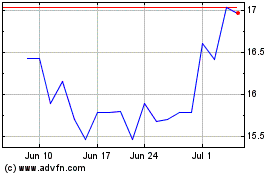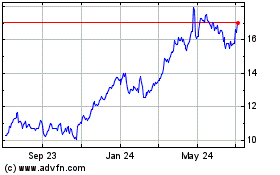By Patricia Kowsmann
European banks have long been considered one of the weaker links
in the global financial system. The coronavirus outbreak on the
continent poses a fresh test of their health.
Shares in European banks have been among the worst hit since the
virus began to spread, first through Italy, and now through much of
the rest of the region. Their stocks took another hammering Monday
amid signs the impact of the virus is starting to hurt economies,
which has immediate effects on banks' business of taking and
lending money.
Shares of UniCredit SpA and Intesa Sanpaolo SpA, both based in
Milan, the epicenter of the virus outbreak in Europe, were down
more than 6% and 5% respectively just after midday. UniCredit,
which has reported the first case of coronavirus among its staff,
is down more than 17% so far this year.
Germany's troubled Deutsche Bank AG, which is undergoing a big
overhaul seen key to its survival, was seeing its stock make rare
gains until the coronavirus took effect. Shares of the bank were
down 5.8% for the day Monday having fallen 17% last week, although
the stock is still up 7% on the year.
France's BNP Paribas SA and Société Générale SA are down close
to 20% this year. Asia-focused but London-listed Standard Chartered
PLC and HSBC Holdings PLC have also seen their shares fall
sharply.
Already toiling amid negative-rates and slow growth, banks have
been slashing costs to survive. Now they face the prospect of the
economies and companies they serve being severely hit by the
coronavirus outbreak, making a challenging outlook much worse.
The cost of funding of major European banks -- a measure of how
risky investors perceive them to be -- has risen sharply since last
week as markets grapple with the speed at which the virus spread to
the continent. Bank stocks, meanwhile, have sunk, leaving many
banks deeper into red so far this year.
"The market conditions and sentiment continue to head south,
with no bottom as-of-yet seen," said Tom Kinmonth, a fixed income
strategist at Dutch bank ABN AMRO Bank NV.
Banks in Europe are better equipped to face a crisis since
boosting capital and liquidity levels following the sovereign debt
crisis in 2010. Funding costs are still below those at the start of
last year despite last week's spike, Mr. Kinmonth said. But a
global recession would translate into a pickup in defaults and
souring loans, forcing banks to take losses and hurting already
weak profitability.
Rattled markets, meanwhile, will hurt investment-banking
activities and private-banking operations. Deutsche Bank, Barclays
PLC and Swiss banks such as Credit Suisse AG and UBS Group AG would
be particularly hit, RBC Capital Markets analysts said.
"The key question mark revolves around the depth and length of
the [virus] containment measures, and the impact these will have on
the economies, which would then in turn affect bank financials,
starting from asset quality," said Marco Troiano, deputy head of
the banks team at rating agency Scope Ratings.
Italian lenders are particularly vulnerable on that front. Some
northern Italian towns were quarantined over a week ago as cases of
the virus suddenly surged. Two regions most affected -- Lombardy,
where Milan is the capital, and Veneto, home to Venice -- account
for almost a third of the country's economic output and about 40%
of Italy's exports.
Any sharper slowdown will affect people's ability to pay their
debts. While bad loans from the past crisis have fallen in recent
years, they still account for 7% of total in the system.
Jérôme Legras, head of research at Axiom Alternative
Investments, said disruption for banks is more akin to the panic
seen during after the Sept. 11, 2001, attacks in New York, rather
than the sovereign-debt crisis that put European countries in a
multiyear recession.
Still, he said he is being cautious on banks that have large
international footprint, especially in Asia and lenders that are
very sensitive to low rates, in case central banks decide to
react.
The gloomy tone comes as many European banks reported
disappointing results for last year, with most blaming low or
negative interest rates that have eaten their profit margins to a
point they can't cover their costs. One of the hopes for the sector
has been consolidation, particularly after the European Central
Bank, which supervises the continent's largest banks, showed
willingness to ease the process, which isn't only risky but also
expensive.
Last month [Feb. 18], Italy's Intesa Sanpaolo launched a EUR4.9
billion ($5.4 billion) takeover bid for a smaller rival UBI Banca
SpA, with many expecting other deals to come. But the current
market commotion will likely freeze any merger discussions,
analysts say.
-- Pat Minczeski in London contributed to this article
Write to Patricia Kowsmann at patricia.kowsmann@wsj.com
(END) Dow Jones Newswires
March 02, 2020 09:29 ET (14:29 GMT)
Copyright (c) 2020 Dow Jones & Company, Inc.
Deutsche Bank Aktiengese... (NYSE:DB)
Historical Stock Chart
From Mar 2024 to Apr 2024

Deutsche Bank Aktiengese... (NYSE:DB)
Historical Stock Chart
From Apr 2023 to Apr 2024
